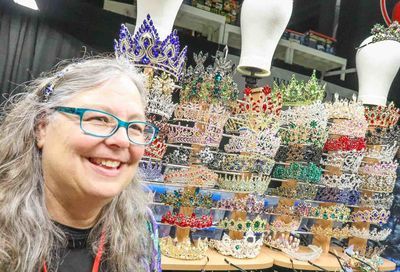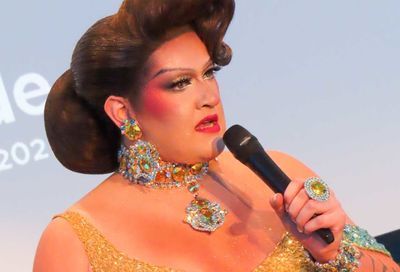A Phoenix from the Flames
Less than a year since LLEGÓ closed its doors, a new LGBT Latino organization is evolving
This time last year, LLEGÓ was suffering ill health. That this organization — the sole national organization representing the LGBT Latino/a community exclusively — would be dead by autumn, however, took most observers by surprise.
Mercedes Garriga, who served as the organization’s finance director from September 2002 till March 2004, wasn’t among them.
”I was sort of like the whistle blower who tried to get the attention of the board members about the financial situation of the organization,” says Garriga, who left Washington to return to her former employer, the Southern Arizona AIDS Foundation. ”[LLEGÓ] had a huge deficit that kept accumulating over the years. They were using the technical-assistance money from the [Centers for Disease Control and Prevention]. They were using it for everything — public policy, lobbying, you name it.
”The other thing was the huge deficit…. They were on an electronic draw-down basis with the CDC. They kept asking for money each month. The deficit didn’t show up till the funds were all used up, when the five-year grant cycle ended. That’s when the huge deficit caught up with them.”
Garriga claims that MartÃn Ornelas-Quintero, LLEGÓ’s executive director during her employment, downplayed the severity of the financial situation while maintaining absolute control over the organization’s funds. Ornelas-Quintero did not reply to a request for an interview, forwarded by his attorney, Lawrence S. Jacobs.
”It’s a lesson for a lot of people,” Garriga says of LLEGÓ’s bankruptcy. ”A lot of people could’ve done the same thing that I did. Until the last minute, they didn’t do anything. I told a few people before I left what was happening, and I felt like no one wanted to believe me.”
Ornelas-Quintero resigned as executive director June 2004. According to his attorney, Ornelas-Quintero’s severance claim against LLEGÓ for $36,416.21 is pending.
Gloria Nieto, a LLEGÓ board member, was tapped to replace Ornelas-Quintero at LLEGÓ’s helm in July 2004. She says she had no idea that her primary function would be to turn off the lights.
”The turning point for all of this came when I was in a meeting with the Gill Foundation, with MartÃn [Ornelas-Quintero and others],” recalls Nieto. The Gill Foundation was one of LLEGÓ’s funders. ”We said, ‘We need “x” amount of dollars,’ and then they sent us this really great accountant. The first day he was there, he said nothing looked too bad. The second day, he said there were some problems. Really big problems.”
As Nieto explains it, the budget for the fiscal year was facing a shortfall of roughly $700,000. Looking at the figure in July, LLEGÓ had already spent $1 million of the $1.2 million technical-assistance grant it had received from the CDC in April, simply to keep the organization operating. That left $200,000 to ride out the next eight months of the fiscal year.
”There was not enough money to keep the agency running,” she says flatly. ”The options were to close or to close.”
It was an extremely painful process, she says, pointing as an example to one employee who was in the midst of the home-buying process, only to be suddenly unemployed. LLEGÓ had about 30 employees.
”A lot of people were trying to do the best they could, but it was kind of like throwing bricks into the Grand Canyon,” Nieto says of the hopelessness of the situation. ”What I tried to do was to be as clear with everyone as possible and tell them what was happening. I would call Kathleen DeBold [executive director of the Mautner Project, the D.C.-based national lesbian health organization] and run down the street and cry to her at Starbucks. There are still some people from the staff who won’t talk to me…. I did everything I could. I was honest and fair. I can live with that.”
By September, LLEGÓ was closed. While former employees may have found themselves in the lurch, so did many activists around the country who had made plans to attend LLEGÓ’s national conference, el Encuentro. The October event in Seattle was titled “Diez Encuentros: Orgullo, Compromiso y Comunidad,” or ”10 Encounters (gatherings): Pride, Commitment and Community.”
Herb Sosa, president of the Unity Coalition of Miami-Dade, a gay Latino group, already had his ticket to Seattle.
”LLEGÓ closed six weeks before their national conference in Seattle,” Sosa explains. ”Many of us from around the country…had made plans to go to this conference. The practical aspect was that people had plane tickets and other non-refundable reservations.
”The Seattle group decided to move forward. ‘Whoever wants to come to Seattle and talk about the loss of LLEGÓ, let’s do it.’ There were about 210 people in Seattle, some of whom were national community leaders. But everyone had the same importance. From that, we had a three-day series of workshops and conferences. There was a lot of discussion about the need for another voice. Would it be a continuation of [LLEGÓ’s] efforts, or wiping the slate clean?”
While the Seattle group didn’t answer all the questions it posed, there was at least an indication that the death of LLEGÓ might mimic the Phoenix. From LLEGÓ’s ashes, a new, yet unnamed, voice is emerging. Meeting in Miami in April, a core group of about two dozen of those Seattle attendees began hammering out an identity.
”We basically left off with goals, a mission statement, priorities for the group,” says Sosa. ”We’re not reinventing LLEGÓ, but some of the points are going to mirror [LLEGÓ]. If I had to sum it up, are we trying to pick up where LLEGÓ left off? No. We are trying to recognize that as leaders of the community, we need some sort of unified voice and representation….
”Whatever form [the new organization] legally takes, it would be irresponsible to say overnight, ‘Boom, let’s just go for it.’ We want to cross all our ‘t’s and dot all our ‘i’s and really listen to the community. We’ve been hearing that many people felt disenfranchised by LLEGÓ. This group has identified that as something we don’t want to repeat.”
The process hasn’t been speedy, but that’s part of the approach, says Sosa.
“Is this moving along as quickly as we’d like? Probably not. But I feel very, very comfortable that we’re doing things right. We’re making sure the voices are heard.”
Garriga, who is aware of the new group’s efforts, says that sort of inclusion is key to a national LGBT Latino group. It’s something that she says was missing during her time at LLEGÓ.
”I was very sad [when I left LLEGÓ]. I was really sad because LLEGÓ didn’t belong to one individual. It belongs to the community,” Garriga insists. ”It’s sad when one person feels he or she has ownership.
”I think [the closing] had to do with power — one individual’s power…. It opened the eyes of the community not to be apathetic. To audit things, to have the books open, to question, to be involved, to have checks and balances.”
Nieto has her own perspective. She seems relieved to have come out of LLEGÓ in one piece. Today, she’s living in San Jose and commuting daily to San Francisco where she is the executive director of Lyon-Martin Women’s Health Services. The community health provider is named for Phyllis Lyon and Del Martin, a pioneering and iconic lesbian couple in the national gay-rights movement.
”I can’t tell you how deliriously happy I am to be here,” she says, obviously at a better point in life than this time last year. ”I got here on a Friday. By that night, I was at an event with the The L Word cast and producer. I have regular conversations with Del Martin and Phyllis Lyon. That is one of the most rewarding experiences of my life.”
Despite her years of experience with LLEGÓ and other non-profits, Nieto has no direct advice for any new national LGBT Latino group.
”I’ve been watching it, but don’t have an opinion at this point,” she says. ”I can’t be anywhere close to this organization, because I believe there could be legal ramifications. That’s what’s been floated out there to me…. I have no clue and no opinion.”
That’s not to say that Nieto doesn’t have some general information that could be useful to any non-profit executive directors.
”I know we didn’t get correct financial information,” Nieto says of her time as a LLEGÓ board member before moving into the top spot. ”I don’t believe I have any advice to offer, except be clear about the financials and the auditing language. In terms of 20/20 hindsight, I wished I’d had a more thorough knowledge of audit language.”
While Sosa says that the new organization forming is not going to follow in LLEGÓ’s footsteps, he is quick to point out that LLEGÓ did more right than wrong. He says he is still in touch with much of the LLEGÓ leadership, and is critical of anyone who may judge LLEGÓ’s nearly two-decade contribution too harshly.
”It was 17 years. They had a very good run,” observes Sosa. ”It was an excellent organization. It’s really easy to be a Monday morning quarterback. But generally speaking, LLEGÓ accomplished a lot. Let’s not lose sight of that.
”I think that LLEGÓ had kind of backed itself into a corner. That’s not meant as a criticism. The reason for LLEGÓ’s demise is not a simple, one-line answer. It happens to a lot of LGBT organizations. The day-to-day keeping the lights on depends on funding. HIV funding is one of the types of funding [most] available to the LGBT community. It’s my opinion, and that of others, that LLEGÓ’s mission was more driven by funding sources, rather than keeping to the mission. You’ve got to stay focused on what the mission is. It seems like LLEGÓ’s mission and day-to-day functions were going in two different directions.”
Still, he adds, ”Seventeen years ago, there was no national LGBT Latino voice. They created that. And I think they did that extremely successfully. They had the ear of Washington, and other cities and towns across America…. There is a Latino LGBT voice out there. Without question, LLEGÓ accomplished that. That we’re even having this discussion, it means the voice exists.”
Garriga and Nieto both express some hope that Sosa and his group will be able to keep that voice in the national dialogue.
”Especially in these very repressive political times, it’s of the utmost importance to have an LGBT Latino/a voice out there,” says Garriga. ”There are a lot of very honest and committed people out there, doing the HIV and LGBT work because they care. They are the ones who are going to make it happen. I hope to be a part of that.”
Says Nieto: ”I know there is a need. The inability to bring queer Latinos together, it kind of leaves us all stranded. That’s a lot of what LLEGÓ served. Without that hub in the wheel, we’ve still got effective local organizations, but without a place to come together.”
Sosa says he is confident that the LGBT Latino organization evolving from that initial meeting in Seattle is on track, with a tentative meeting planned for October, possibly in Washington, D.C.
”It’s monumental to try to pull together a national group of any sort, but I think we’re well on our way,” says Sosa. ”Within the next few months, there will be a more formalized group, appearing at the national level.”
Support Metro Weekly’s Journalism
These are challenging times for news organizations. And yet it’s crucial we stay active and provide vital resources and information to both our local readers and the world. So won’t you please take a moment and consider supporting Metro Weekly with a membership? For as little as $5 a month, you can help ensure Metro Weekly magazine and MetroWeekly.com remain free, viable resources as we provide the best, most diverse, culturally-resonant LGBTQ coverage in both the D.C. region and around the world. Memberships come with exclusive perks and discounts, your own personal digital delivery of each week’s magazine (and an archive), access to our Member's Lounge when it launches this fall, and exclusive members-only items like Metro Weekly Membership Mugs and Tote Bags! Check out all our membership levels here and please join us today!























